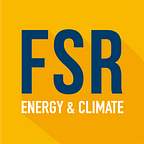Regulating innovation and technology
in pursuit of EU’s energy goals for 2030
by Gokce Mete, Research Fellow, University of Dundee
Today, the most visible aspect of energy law is climate change.
The Paris Agreement prompts radical innovations to achieve the energy transition. As a consequence, technological, policy, regulatory and legal innovation becomes ever more important for economic prosperity. Indeed, the emergence of disruptive technologies needs to be guided by policies that facilitate a structural change and smooth out the process.
The technology and regulation interface is a two-way street.
The interface between technological innovation and regulation is mutual. Regulation directly affects the character of innovation setting the direction of travel for new technologies and services. At the same time, technological and service innovations have significant (often retrospective) impacts on regulation, necessitating adaptation to change.
Energy law in the EU is already responding to the demands of technology.
In 2018, the EU countries have agreed on a new 2030 Framework, based on the ‘Clean Energy for All’ legislative package which proposed a new set of legislation to take the climate change agenda a step further post-2020 and to place gradual targets for the reduction of GHG emissions up to 2050. The 2030 strategy sends a strong signal to the market, encouraging private investment in new and improved low-carbon technologies. Another landmark document that saw the light of day in 2018 is the Commission’s strategic long-term vision for a prosperous, modern, competitive and climate-neutral economy by 2050. This set of legislative and policy measures is expected to have a transformative effect on all segments of the energy value chain.
The Clean Energy Package and Energy Union objectives are headed in the right direction.
The overarching aim of the Commission’s recent legislative package is twofold: to empower the European consumers putting them at the centre of market design, while at the same time, to retain the benefits of and strengthen integrated wholesale energy markets in Europe.
Digital technologies play an increasingly important role in the energy sector both on the software and the hardware level.
The Clean Energy Package, along with the European Strategic Energy Technology Plan (SET Plan), already allow us to paint a picture of future transformation in the energy sector. That said, there is more to come. A new policy frontier that will be developed further is about bringing together the Energy Union and Digital Single Market strategies. The merging of the two strategies could facilitate opening more avenues for digitalisation of the energy sector, both on the hardware (infrastructure) and the software (regulation and design of products and services) level. It is expected to boost synergies and exchanges of good practices between the energy and the telecoms industries.
The energy sector to become increasingly more exposed to cybersecurity threats.
Digitalisation of the sector comes with a number of opportunities and equally, a number of challenges. The increasing pace and scale of digital innovation would require new solutions to ensure cybersecurity, protecting the systems from information theft, blackouts and many more threats to system reliability. With the adoption of the Directive on Security of Network and Information Systems and the General Data Protection Regulation, the EU with its Member States is forming the basis for relevant cybersecurity provisions. The Clean Energy Package also acknowledges the importance of cyber security for the energy sector. It proposes the adoption of measures to prevent and mitigate the risks identified as well as the adaption of technical rules for electricity (i.e. a Network Code) on cyber-security.
As the energy landscape is expected to be transforming at an increasingly fast pace, the bar for quality of regulatory changes is being set quite high.
Regulators and policymakers would need to be able to calibrate new interventions in a way that enable innovation, facilitating consumer empowerment, and at the same time, allow retaining the benefits of the current market design.
